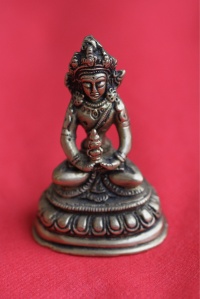Yoga Philosophy
We’ve been diving quite deeply into the extremely broad subject of Yoga Philosophy. The mind is swirling with concepts of Vedanta, Sankhya, Nyaya, Vaisheshika, Mimamsa, Jainism, Charuvarism, Buddhism, the Vedas, and the Ashramas (four stages of life). It’s fairly heavy going, but also fascinating and rich in the history and the culture of ancient India.
Parts of the Vedanta philosophy appeal to me: focusing on the “right understanding of life”, by inquiring and understanding through direct experience, not only from prescribed texts or structured education. “When knowledge ends, intuition begins”. If we want to explore Consciousness and subtle energies, we try not to have expectations based only on the past. Instead, our minds explore intuitively in every moment, expanding our perception of reality; changing our reality by changing the way we look at the world (we’re back to the What is Elephant story again!)
 The Buddhist Philosophy that human suffering is caused by the constant craving for things that make us happy (temporarily) and that we should systematically destroy those cravings, is challenging, but it makes sense to me.
The Buddhist Philosophy that human suffering is caused by the constant craving for things that make us happy (temporarily) and that we should systematically destroy those cravings, is challenging, but it makes sense to me.
This echoes Patanjali’s teachings that practicing detachment from desires brings us to a more peaceful state of mind. It’s not the renunciation of the desire itself – what causes suffering is the cravings for those desires and attaching to them as the only way to find happiness. The yoga Yama (observance) of Aparigraha speaks of this same non-attachment.


I’ve been trying to practice non-attachment to the lemon cheesecake apparently favoured by Richard Gere on his visit to Nick’s Restaurant in McLeod Ganj!
You can still desire gooey chocolate cake, sex, a car, a fab new handbag, a holiday, or rocking a fantastic Astavakrasana pose [insert any other experience or material item you desire here], but the key is to be detached from your desires to the point that if they remain unfulfilled, you can still be content – you are not relying on the hit of pleasure to create a contentment within. Because when we crave something as the solution to finding happiness, that joy is short-lived and then we restlessly go back to craving more pleasure again and are never satisfied. Sound familiar?
Per Yogi Sivadas: “The Yoga of Emotion is maintaining a feeling of contentment, without dependency on external things”.
Throughout our yoga philosophy studies, Yogi Sivadas constantly tells us he is not preaching about what is the right way, or the only way. He encourages us to consider what we’re taught, and question the parts that don’t make sense to us. “Yoga is about learning through experience,” he says. “When you repeat yoga concepts like a machine, you’re simply storing the information, like a computer. You should not be a hard drive.”
To make your yoga more meaningful, allow it to be a continuous adventure of researching, questioning, experimenting, observing, learning – and absorbing the messages that make most sense to you.



Non attachment to the cheesecake would be easy compared to non attachment to Richard Here! Sign me up baby!
Did you notice your Freudian slip on Richard Here?!
HA! HA!
[…] to see HHDL. There’s some irony in that acceptance, since the Buddhist and Yoga philosophy of non-attachment suggests that to avoid suffering, we should detach from our desires to the point that if they […]
[…] to see HHDL. There’s some irony in that acceptance, since the Buddhist and Yoga philosophy of non-attachment suggests that to avoid suffering, we should detach from our desires to the point that if they […]